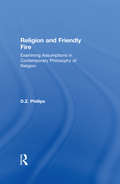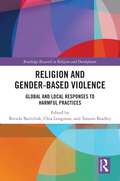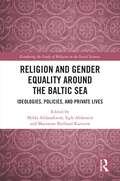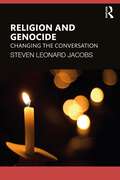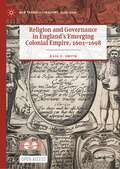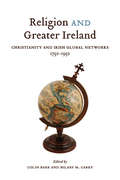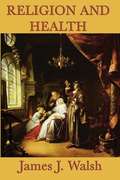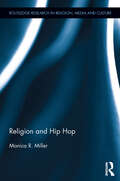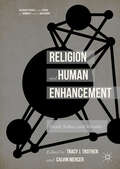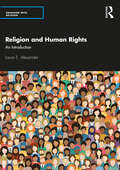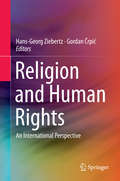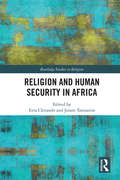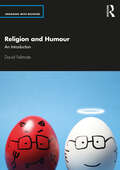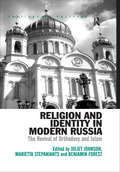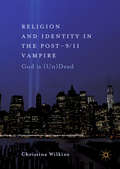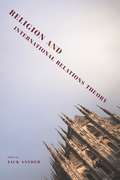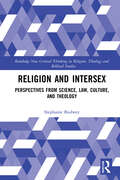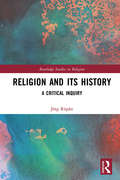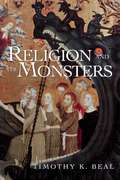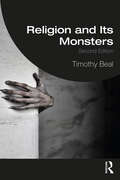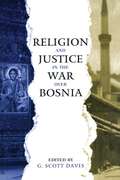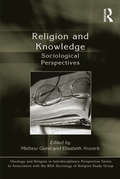- Table View
- List View
Religion and Freedom of Thought
by Perry Miller Robert L. Calhoun Nathan M. Pusey Reinhold Niebuhr Henry P. Van DusenWritings on this subject by scholars.
Religion and Friendly Fire: Examining Assumptions in Contemporary Philosophy of Religion
by D.Z. PhillipsIn locating friendly fire in contemporary philosophy of religion, D.Z. Phillips shows that more harm can be done to religion by its philosophical defenders than by its philosophical despisers. Friendly fire is the result of an uncritical acceptance of empiricism, and Phillips argues that we need to examine critically the claims that individual consciousness is the necessary starting point from which we have to argue: for the existence of an external world and the reality of God; that God is a person without a body, a pure consciousness; and that to assent to a religious belief is essentially to assign a truth value to a proposition independent of any confessional context. When these products of friendly fire are avoided, we arrive at a new understanding of belief, trust and the soul, and refuse to say more or less than we know about the realities of human life in the service of religious apologetics.
Religion and Gender-Based Violence: Global and Local Responses to Harmful Practices (Routledge Research in Religion and Development)
by Brenda Bartelink Chia Longman Tamsin BradleyThis book takes religion as an entry point for a deeper exploration into why practices of gender-based violence continue and what possible actions might help to contribute to their eradication. International donors are committed to reducing and ending gender-related harm, particularly violence against women, but clear answers as to why harmful practices persist are often slow to emerge. Theological research struggles to find strong links, yet religion is often referred to by local people as the reason for practices such as female cutting, male circumcision, early and forced marriage, nutritional taboos and birth practices, mandatory (un)veiling, harmful spiritual practices, polygamy, gender unequal marital and inheritance rights and so-called honour crimes. This book presents empirical cases of religious, non-religious and secular actors, including local and international governmental and non-governmental agencies in the fields of development, health and equality policies. Tracing their different understandings of how religion is entangled with gender-based violence both contextually as well as historically, the book sheds light on helpful and unhelpful as well as erroneous and harmful understandings of such practices in local and global perspectives. Centralising the perspectives of women themselves, this book will be an important read for development practitioners and policy makers, as well as for researchers across religious studies, gender studies, and global development.
Religion and Gender Equality around the Baltic Sea: Ideologies, Policies, and Private Lives (Gendering the Study of Religion in the Social Sciences)
by Milda Ališauskienė Eglė Aleknaitė Marianne Bjelland KartzowThis volume aims to rethink the intersections of gender and religion, as well as the secular and religious, in implementing and challenging gender equality at individual, institutional, and societal levels in the regions around the Baltic Sea. Acknowledging the diversity of societies and the significance of socio-historical contexts, the empirical data discussed in this book draw attention to the under-researched region of post-socialist Baltic states. The analyses presented in the chapters are based on fieldwork carried out in Lithuania, Latvia, Estonia, and Norway. This volume includes sociological, anthropological, historical, political science, and theological perspectives and covers five broad research areas: a shifting concept of gender equality and its developments in Baltic and Nordic countries; a diversity of developments within religious groups related to issues of gender equality and the negotiation of competing gender ideologies; inter-religious developments and gender equality; the role of religions in the construction of public discourse on gender equality; and religious socialization, focusing on the promotion of religious gender models through socialization and public education.
Religion and Genocide: Changing the Conversation
by Steven Leonard JacobsReligion and Genocide: Changing the Conversation is a cutting-edge introduction to the complex and controversial relationship between religion and genocide. This book aims to widen the reader’s understanding of religion and those who practice it, the nexus of religion and violence, and those who legitimate their violence by framing it in religious terms by looking at notions of holy wars, religious wars, and genocide and the practitioners of such. This book delves into our current thinking of ourselves as biological entities, our relationship to genocide, and the impact of geography (including climate change) and diseases on our humanity and our ability to commit genocide. Tying together all these seemingly disparate threads, this text concludes with the significant and still largely unanswered question: "Where do we go from here?". Highlighting the complex relationship between religion and genocide, this is an essential read for students and academics studying religion and violence, Judaism, Judaic studies, and holocaust and genocide studies. Religion and Genocide will also be of interest to researchers in related subjects such as history, politics, sociology, and anthropology.
Religion and Governance in England’s Emerging Colonial Empire, 1601–1698 (New Transculturalisms, 1400–1800)
by Haig Z. SmithThis open access book explores the role of religion in England's overseas companies and the formation of English governmental identity abroad in the seventeenth century. Drawing on research into the Virginia, East India, Massachusetts Bay, Plymouth, New England and Levant Companies, it offers a comparative global assessment of the inextricable links between the formation of English overseas government and various models of religious governance across England's emerging colonial empire. While these approaches to governance varied from company to company, each sought to regulate the behaviour of their personnel, as well as the numerous communities and faiths which fell within their jurisdiction. This book provides a crucial reassessment of the seventeenth-century foundations of British imperial governance.
Religion and Greater Ireland
by Colin Barr Hilary M. CareyImpelled by economic deprivation at home and spiritual ambition abroad, nineteenth-century Irish clerics and laypeople reshaped the many sites where they came to pray, preach, teach, trade, and settle. So decisive was the role of religion in the worlds of Irish settlement that it helped to create a "Greater Ireland" that encompassed the entire English-speaking world and beyond. Rejecting the popular notion that the Irish were passive victims of imperial oppression, Religion and Greater Ireland demonstrates how religion opened up a vast world to exploit. The religious free market of the United States and the British Empire provided an opportunity and a level playing-field in which the Irish could compete and thrive. Contributors to this collection show how the Irish of all denominations contributed to the creation and extension of Greater Ireland through missionary and temperance societies, media, and the circulation of people, ideas, and material culture around the world. Essays also detail the diverse experiences of Irish immigrants, whether they were Catholics or Protestants, clergy or laypeople, women or men, in sites of settlement and mission including the United States, Canada, South Africa, Asia, Australia, New Zealand, and Ireland itself. Seeking to illuminate the interconnections and commonalities of the Irish migrant experience, Religion and Greater Ireland provides fascinating insight into the range of influences that Ireland's religions have had on the world beyond the British Isles.
Religion and Greater Ireland: Christianity and Irish Global Networks, 1750-1969 (McGill-Queen's Studies in the History of Religion)
by Colin Barr Hilary M. CareyImpelled by economic deprivation at home and spiritual ambition abroad, nineteenth-century Irish clerics and laypeople reshaped the many sites where they came to pray, preach, teach, trade, and settle. So decisive was the role of religion in the worlds of Irish settlement that it helped to create a "Greater Ireland" that encompassed the entire English-speaking world and beyond. Rejecting the popular notion that the Irish were passive victims of imperial oppression, Religion and Greater Ireland demonstrates how religion opened up a vast world to exploit. The religious free market of the United States and the British Empire provided an opportunity and a level playing-field in which the Irish could compete and thrive. Contributors to this collection show how the Irish of all denominations contributed to the creation and extension of Greater Ireland through missionary and temperance societies, media, and the circulation of people, ideas, and material culture around the world. Essays also detail the diverse experiences of Irish immigrants, whether they were Catholics or Protestants, clergy or laypeople, women or men, in sites of settlement and mission including the United States, Canada, South Africa, Asia, Australia, New Zealand, and Ireland itself. Seeking to illuminate the interconnections and commonalities of the Irish migrant experience, Religion and Greater Ireland provides fascinating insight into the range of influences that Ireland’s religions have had on the world beyond the British Isles.
Religion and Health
by James J. WalshJames Joseph Walsh, M.D., LL.D., Litt.D., Sc.D. (1865-1942) was an American physician and author, born in New York City. He graduated from Fordham College in 1884 and from the University of Pennsylvania (M.D.) in 1895. After postgraduate work in Paris, Vienna, and Berlin, he settled in New York.
Religion and Hip Hop: Mapping The New Terrain (Routledge Research in Religion, Media and Culture #3)
by Monica R. MillerReligion and Hip Hop brings together the category of religion, Hip Hop cultural modalities and the demographic of youth. Bringing postmodern theory and critical approaches in the study of religion to bear on Hip Hop cultural practices, this book examines how scholars in religious and theological studies have deployed and approached religion when analyzing Hip Hop data. Using existing empirical studies on youth and religion to the cultural criticism of the Humanities, Religion and Hip Hop argues that common among existing scholarship is a thin interrogation of the category of religion. As such, Miller calls for a redescription of religion in popular cultural analysis - a challenge she further explores and advances through various materialist engagements. Going beyond the traditional and more common approach of analyzing rap lyrics, from film, dance, to virtual reality, Religion and Hip Hop takes a fresh approach to exploring the paranoid posture of the religious in popular cultural forms, by going beyond what "is" religious about Hip Hop culture. Rather, Miller explores what rhetorical uses of religion in Hip Hop culture accomplish for various and often competing social and cultural interests.
Religion and Human Enhancement
by Tracy J. Trothen Calvin Mercer"Transhumanism" or "human enhancement" is an intellectual and cultural movement that advocates the use of emerging technologies to change human traits. Although they may sound like science fiction, the possibilities suggested by transhumanism are very real, and the questions they raise have no easy answers. If these enhancements especially major ones like the indefinite extension of healthy human life become widely available, they would arguably have a more radical impact on humankind than any other development in history. This book comprises essays that explore transhumanism and the issues that surround it, addressing numerous fascinating questions posed by scholars of religion from various traditions. How will "immortality" or extreme longevity change our religious beliefs and practices? How might pharmaceuticals enhance spiritual experiences? Will "post-human" technologies be available to all persons, or will a superior "post-human race" arise to dominate the human species? The discussions are as intriguing as the future they suggest. "
Religion and Human Rights: An Introduction (Engaging with Religion)
by Laura E. AlexanderThis book highlights perspectives from religious traditions worldwide, in conversation with other communities who promote, critique, or question the idea of human rights. It shows how human rights can provide a platform for dialogue among groups of people from diverse backgrounds who seek to address pressing issues of human well-being. In each chapter, readers will be introduced to religious and human rights perspectives on specific global issues. Intersecting with these issues, the work examines history and philosophy of human rights, for a generally accessible overview of human rights theory, foundations, and critique. Specific case studies woven through the book will also help both students and advocates – whether they are part of religious communities or not – engage more deeply with particular areas of concern. This volume is a useful resource for undergraduate students who are learning about the relationship between religion and human rights in a classroom for the first time, as well as upper-level and graduate students looking for a broad basis of knowledge and a starting point for digging deeper into specific areas of scholarship.
Religion and Human Rights
by Hans-Georg Ziebertz Gordan ČrpićThis book examines the relationship between human rights and religiosity. It discusses whether the impact of religiosity on human rights is liberational or suppressive, and sheds light on the direction in which the relationship between religion and human rights is expected to develop. The questions explored in this volume are: Which are the rights that are currently debated or under pressure? What is the position on human rights that churches and religious communities represent? Are there tensions between churches, religious communities and the state? Which rights are especially relevant for young people and which relate to adolescents life-world experiences? Covering 17 countries, the book describes two separate, yet connected studies. The first study presents research by experts from individual countries describing the state of human rights and neuralgic points anticipated in individual societies. The other study presents specific findings on the relationship between these two social phenomena from empirical research in a population of high school students. Studying this particular population allows insights into social trends, value systems and attitudes on human rights, as well as an indication of the likely directions of development, and potential room for intervention.
Religion and Human Security in Africa (Routledge Studies in Religion)
by Ezra Chitando Joram TarusariraAcross diverse countries and contexts in Africa, religion has direct implications for human security. While some individuals and groups seek to manipulate and control through the deployment of religion, religious belief is also a common facet of those working towards peace and reconciliation. Despite the strategic importance of religion to human security in Africa, there are few contemporary publications that explore this issue on an international scale. This volume redresses that imbalance by examining religion’s impact on human security across Africa. Written by an international team of contributors, this book looks in detail at the intersection of religion and security in a variety of African contexts. Case studies from a diverse set of countries including Nigeria, Ghana, South Africa, Burkina Faso, and more, are used to illustrate wider trends across the continent. Acknowledging that religion can be used to incite violence as well as encourage peace, the chapters employ an interdisciplinary exploration of the ethics, sociology, and politics around these issues. This is much needed volume on religion’s capacity to effect human security. It will, therefore, be of significant interest to any scholar of religious studies, African studies, political science, the sociology of religion, and anthropology, as well as peace, conflict, and reconciliation studies.
Religion and Humour: An Introduction (Engaging with Religion)
by David FeltmateThis timely and lively introduction to exploring the intersection of religion and humour evaluates existing scholarship and methodologies within the field, arguing for a culturally critical approach to the study.Hinged on a qualitative sociological framework, this book asks questions about the construction, presentation, and purpose of humour in religious contexts. It is broken down by theoretical approach, with chapters covering: a “comparative religions” approach; a theological approach; how social sciences offer us useful tools for research; and a review of existing theoretical models. As the first volume to introduce the field of religion and humour, this engaging book is essential reading for students approaching the topic for the first time, and for anyone with an interest in related fields such as religion and popular culture and humour studies.
Religion and Identity in Modern Russia: The Revival of Orthodoxy and Islam (Post-Soviet Politics)
by Juliet Johnson Marietta Stepaniants Benjamin ForestFocusing on the roles of Russian Orthodoxy and Islam in constituting, challenging and changing national and ethnic identities in Russia, this study takes Tsarist and Soviet legacies into account, paying special attention to the evolution of the relationship between religious teachings and political institutions through the late 19th and 20th centuries. The volume explicitly discusses and compares the role of Russia's two major religions, Orthodoxy and Islam, in forging identity in the modern era and brings an innovative blend of sociological, historical, linguistic and geographic scholarship to the problem of post-Soviet Russian identity. This comprehensive volume is suitable for courses on post-Soviet politics, Russian studies, religion and political culture.
Religion and Identity in the Post-9/11 Vampire: God Is (un)dead
by Christina WilkinsThis book offers a unique argument for the emergence of a post-9/11 vampire that showcases changing perspectives on identity and religion in American culture, offering a look at how cultural narratives can be used to work through trauma. Cultural narratives have long played a valuable role in mediating difficult and politically sensitive topics. Christina Wilkins addresses how the figure of the vampire is used in modern narratives and how it has changed from previous incarnations, particularly in American narratives. The vampire has been a cultural staple for centuries but the current conception of the figure has been arguably Americanized with the rise of the modern American vampire coinciding with the aftermath of 9/11. Wilkins investigates changes evident in cultural representations, and how they effectively mediate the altered approach to issues of trauma and identity. By investing metaphorical tropes with cultural significance, the book offers audiences the opportunity to consider new perspectives and prompt important discussions while also illuminating changes in societal attitudes.
Religion and Inequality in America
by Lisa A. Keister Darren E. SherkatDespite the growing quantity and quality of research connecting religion to inequality, no single volume to date brings together key figures to discuss various components of this process. This volume aims to fill this gap with contributions from top scholars in the fields of religion and sociology. The essays in this volume provide important new details about how and why religion and inequality are related by focusing on new indicators of inequality and well-being, combining and studying mediating factors in new and informative ways, focusing on critical and often understudied groups, and exploring the changing relationship between religion and inequality over time.
Religion and International Relations Theory (Religion, Culture, and Public Life #10)
by Jack SnyderReligious concerns stand at the center of international politics, yet key paradigms in international relations, namely realism, liberalism, and constructivism, barely consider religion in their analysis of political subjects. The essays in this collection rectify this. Authored by leading scholars, they introduce models that integrate religion into the study of international politics and connect religion to a rising form of populist politics in the developing world. Contributors identify religion as pervasive and distinctive, forcing a reframing of international relations theory that reinterprets traditional paradigms. One essay draws on both realism and constructivism in the examination of religious discourse and transnational networks. Another positions secularism not as the opposite of religion but as a comparable type of worldview drawing on and competing with religious ideas. With the secular state's perceived failure to address popular needs, religion has become a banner for movements that demand a more responsive government. The contributors to this volume recognize this trend and propose structural and theoretical innovations for future advances in the discipline.
Religion and Intersex: Perspectives from Science, Law, Culture, and Theology (Routledge New Critical Thinking in Religion, Theology and Biblical Studies)
by Stephanie A. BudweyThis book considers the situation of intersex people who have faced erasure in the areas of science, law, culture, and theology due to the assumption that all humans are either ‘female’ or ‘male.’ Centered in interviews conducted with German intersex Christians, this book argues that moving from a paradigm of sexual dimorphism to sexual polymorphism will help promote the full humanity and flourishing of intersex people by creating a world where intersex individuals are no longer coerced and/or forced to undergo non-consensual, medically unnecessary treatment, no longer experience human rights violations because of their lack of legal protection, no longer feel inhuman and Other due to epistemic injustice that stems from socio-cultural norms and stereotypes, are no longer told they are not made in God’s image as a result of a sexually dimorphic understanding of Genesis 1:27, and no longer feel excluded and invisible in worship services that do not recognize them. This combination of the practical and the spiritual allows for a reconsideration of the medical treatment and pastoral care that should be available to intersex people. This book will be helpful to those in the disciplines of science, law, culture, and theology, particularly those in gender and theological studies and those already in and studying for lay and ordained ministry.
Religion and its History: A Critical Inquiry (Routledge Studies in Religion)
by Jörg RüpkeReligion and its History offers a reflection of our operative concept of religion and religions, developing a set of approaches that bridge the widely assumed gulf between analysing present religion and doing history of religion. Religious Studies have adapted a wide range of methodologies from sociological tool kits to insights and concepts from disciplines of social and cultural studies. Their massive historical claims, which typically idealize and reify communities and traditions, and build normative claims thereupon, lack a critical engagement on the part of the researchers. This book radically rethinks and critically engages with these biases. It does so by offering neither an abridged global history of religion nor a small handbook of methodology. Instead, this book presents concepts and methods that allow the analysis of contemporary and past religious practices, ideas, and institutions within a shared framework.
Religion and Its Monsters
by Timothy BealReligion's great and powerful mystery fascinates us, but it also terrifies. So too the monsters that haunt the stories of the Judeo-Christian mythos and earlier traditions: Leviathan, Behemoth, dragons, and other beasts. In this unusual and provocative book, Timothy K. Beal writes about the monsters that lurk in our religious texts, and about how monsters and religion are deeply entwined. Horror and faith are inextricable. Ans as monsters are part of religious texts and traditions, so religion lurks in the modern horror genre, from its birth in Dante's Inferno to the contemporary spookiness of H.P. Lovecraft and the Hellraiser films. Religion and Its Monsters is essential reading for students of religion and popular culture, as well as any readers with an interest in horror.
Religion and Its Monsters
by Timothy BealReligious encounters with mystery can be fascinating, but also terrifying. So too when it comes to encounters with the monsters that haunt Jewish and Christian traditions. Religion has a lot to do with horror, and horror has a lot to do with religion. Religion has its monsters, and monsters have their religion. In this unusual and provocative book, Timothy Beal explores how religion, horror, and the monstrous are deeply intertwined. This new edition has been thoughtfully updated, reflecting on developments in the field over the past two decades and highlighting its contributions to emerging conversations. It also features a new chapter, "Gods, Monsters, and Machines," which engages cultural fascinations and anxieties about technologies of artificial intelligence and machine learning as they relate to religion and the monstrous at the dawn of the Anthropocene. Religion and Its Monsters is essential reading for students and scholars of religion and popular culture, as well as for any readers with an interest in horror theory or monster theory.
Religion and Justice in the War Over Bosnia
by G. Scott DavisThis volume brings together a distinguished group of thinkers, working in ethics, religion and history, to explore moral and religious issues that underlie the violence in Bosnia. ********************************************************* This volume brings together a distinguished group of thinkers to explore the moral and religious issues that underlie the violence and atrocities in Bosnia. From diverse academic and philosophical perspectives, the works of Jean Bethke Elshtain, James Turner Johnson, Michael Sells, John Kelsay, and G. Scott Davis will inform not just scholars of ethics, politics and religion, but everyone concerned with the prospects for justice in the post Cold War world.
Religion and Knowledge: Sociological Perspectives (Theology and Religion in Interdisciplinary Perspective Series in Association with the BSA Sociology of Religion Study Group)
by Mathew GuestReligions have always been associated with particular forms of knowledge, often knowledge accorded special significance and sometimes knowledge at odds with prevailing understandings of truth and authority in wider society. New religious movements emerge on the basis of reformulated, often controversial, understandings of how the world works and where ultimate meaning can be found. Governments have risen and fallen on the basis of such differences and global conflict has raged around competing claims about the origins and content of religious truth. Such concerns give rise to recurrent questions, faced by academics, governments and the general public. How do we treat statements made by religious groups and on what basis are they made? What authorities lie behind religious claims to truth? How can competing claims about knowledge be resolved? Are there instances when it is appropriate to police religious knowledge claims or restrict their public expression? This book addresses the relationship between religion and knowledge from a sociological perspective, taking both religion and knowledge as phenomena located within ever changing social contexts. It builds on historical foundations, but offers a distinctive focus on the changing status of religious phenomena at the turn of the twenty-first century. Including critical engagement with live debates about intelligent design and the ’new atheism’, this collection of essays brings recent research on religious movements into conversation with debates about socialisation, reflexivity and the changing capacity of social institutions to shape human identities. Contributors examine religion as an institutional context for the production of knowledge, as a form of knowledge to be transmitted or conveyed and as a social field in which controversies about knowledge emerge.

